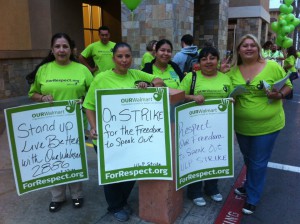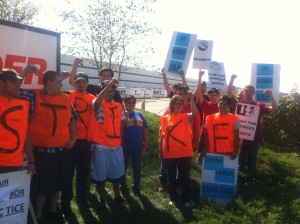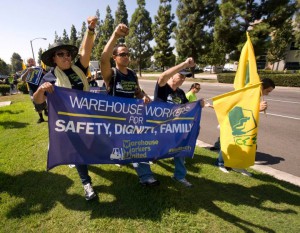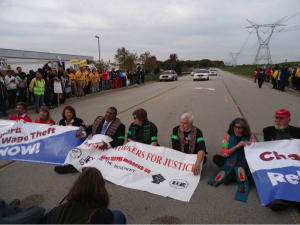 Walmart workers throughout the supply chain have been very vocal over the last few months. From warehouse to retail, workers are stepping out of the shadows to speak out against poor working conditions and retaliation by Walmart and its contractors. This past month, warehouse workers in Southern California and in Illinois went on strike, while Walmart workers around the country went out on one-day strikes.
Walmart workers throughout the supply chain have been very vocal over the last few months. From warehouse to retail, workers are stepping out of the shadows to speak out against poor working conditions and retaliation by Walmart and its contractors. This past month, warehouse workers in Southern California and in Illinois went on strike, while Walmart workers around the country went out on one-day strikes.
 On September 12, several dozen Walmart warehouse workers in Mira Loma, California, went on strike to protest retaliation and unfair labor practices committed by their employers, NFI and Warestaff. Working with FCWA member Warehouse Workers United, these workers called on Walmart to take responsibility for the terrible working conditions in the warehouses, which are devoted to Walmart products. Workers walked off the job after exhausting all other options to address their workplace concerns. After speaking out about low wages and dangerous working conditions, workers at the warehouse were suspended, demoted, and even fired for standing up for their rights.
On September 12, several dozen Walmart warehouse workers in Mira Loma, California, went on strike to protest retaliation and unfair labor practices committed by their employers, NFI and Warestaff. Working with FCWA member Warehouse Workers United, these workers called on Walmart to take responsibility for the terrible working conditions in the warehouses, which are devoted to Walmart products. Workers walked off the job after exhausting all other options to address their workplace concerns. After speaking out about low wages and dangerous working conditions, workers at the warehouse were suspended, demoted, and even fired for standing up for their rights.
 Also in protest of unsafe working conditions and retaliation, Walmart warehouse workers in Elwood, Illinois, went on strike a few days later on September 15 with the Warehouse Workers for Justice. These workers, employed at Walmart’s contractor Roadlink Workforce Solutions, faced similar issues as the warehouse workers in Southern California. Both groups of workers have filed numerous labor complaints and lawsuits against their employers claiming everything from wage theft to being denied breaks.
Also in protest of unsafe working conditions and retaliation, Walmart warehouse workers in Elwood, Illinois, went on strike a few days later on September 15 with the Warehouse Workers for Justice. These workers, employed at Walmart’s contractor Roadlink Workforce Solutions, faced similar issues as the warehouse workers in Southern California. Both groups of workers have filed numerous labor complaints and lawsuits against their employers claiming everything from wage theft to being denied breaks.
 Walmart warehouse workers even launched a 50-mile pilgrimage from Ontario to Los Angeles on September 13 to bring attention to the deplorable working conditions they suffer under. Over 6 days, workers marched through 103-degree heat while sleeping on church floors and relying on meals donated by supporters. The marched concluded in downtown Los Angeles where workers delivered a letter to Walmart executives detailing some of the harsh conditions that Walmart warehouse workers endure. This pilgrimage was successful in bringing attention to issues including: inadequate access to clean water, wages as low as $8 per hour or $12,000 per year with little access to health benefits, no regular breaks, dangerous or broken work equipment, and extreme high temperatures on the job.
Walmart warehouse workers even launched a 50-mile pilgrimage from Ontario to Los Angeles on September 13 to bring attention to the deplorable working conditions they suffer under. Over 6 days, workers marched through 103-degree heat while sleeping on church floors and relying on meals donated by supporters. The marched concluded in downtown Los Angeles where workers delivered a letter to Walmart executives detailing some of the harsh conditions that Walmart warehouse workers endure. This pilgrimage was successful in bringing attention to issues including: inadequate access to clean water, wages as low as $8 per hour or $12,000 per year with little access to health benefits, no regular breaks, dangerous or broken work equipment, and extreme high temperatures on the job.
After a 15-day strike that included the 6-day pilgrimage, the warehouse workers in California returned to work on September 28th after winning safety improvements on the job. The strikes and the pilgrimage forced Walmart to address the serious health and safety concerns brought up by its warehouse workers. Though Walmart initially brushed off workers’ concerns about their working conditions, a Walmart spokesperson told the Huffington Post that they are “developing a protocol for random third party inspections” and “conducting contract reviews with…service providers with an eye towards implementing specific health and safety requirements.”
 Meanwhile, the warehouse workers in Illinois stayed on strike for 21 days, but also returned to work after winning a history victory. After warehouse workers, clergy, and community supporters successfully shut down Walmart’s largest distribution center, which led to the arrests of 17 peaceful protestors, the pressure was on Walmart to take responsibility for the conditions in its warehouses. All striking Elwood workers returned to work on October 6 with full back pay for their time out on strike and an end to illegal retaliation against workers protesting poor working conditions.
Meanwhile, the warehouse workers in Illinois stayed on strike for 21 days, but also returned to work after winning a history victory. After warehouse workers, clergy, and community supporters successfully shut down Walmart’s largest distribution center, which led to the arrests of 17 peaceful protestors, the pressure was on Walmart to take responsibility for the conditions in its warehouses. All striking Elwood workers returned to work on October 6 with full back pay for their time out on strike and an end to illegal retaliation against workers protesting poor working conditions.
On October 4, Los Angeles members of OUR Walmart took another historic step by walking off the job in a one-day strike to protest unfair and safe working conditions for the first time in Walmart history. These retail workers have been calling on Walmart to address issues concerning scheduling, benefits, wages, and above all, respect in the workplace for over a year now. Walmart has responded by retaliating against the workers through intimidation, unfair disciplinary actions, and even firings, so workers are standing up for their rights by striking.
 Walmart retail workers are not only striking in Los Angeles. On October 9, workers from 28 stores in 12 different states including Florida, Texas, California, Washington, Illinois, Kentucky, Missouri, Minnesota and Maryland also walked off the job to protest Walmart’s illegal retaliation against its associates who are speaking out for better jobs. Striking Walmart associates, along with labor supports and community members, also protested at Walmart’s global corporate headquarters in Bentonville, Arkansas, where Walmart was holding its annual finance analyst meeting.
Walmart retail workers are not only striking in Los Angeles. On October 9, workers from 28 stores in 12 different states including Florida, Texas, California, Washington, Illinois, Kentucky, Missouri, Minnesota and Maryland also walked off the job to protest Walmart’s illegal retaliation against its associates who are speaking out for better jobs. Striking Walmart associates, along with labor supports and community members, also protested at Walmart’s global corporate headquarters in Bentonville, Arkansas, where Walmart was holding its annual finance analyst meeting.
This wave of Walmart supply chain strikes is unprecedented in the company’s history. It signifies that Walmart workers are fed up with the lack of respect at work, unsafe working conditions, low wages, and retaliation. While front line workers are facing hardships on the job, Walmart is making almost $16 billion in profits per year. OUR Walmart, a worker organization founded by Walmart Associates, is growing and has spread to hundreds of stores across 43 states. If Walmart does not stop retaliating against workers trying to organize and reinstate workers already fired for speaking out, Walmart associates are now threatening to coordinate nationwide actions on Black Friday, November 23, the most profitable shopping day of the year.
Sign this pledge to support Walmart associates’ demands to end retaliation and to receive more information about how you can participate in any actions being planned for Black Friday. Visit www.makingchangeatwalmart.org for more up-to-date information on this campaign to change Walmart.
